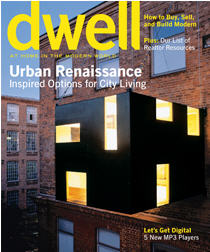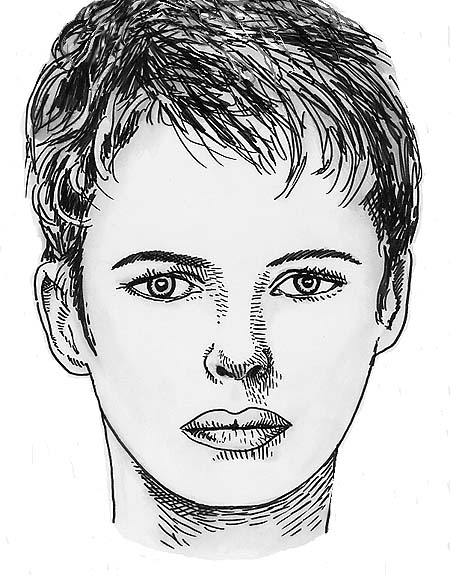View current page
...more recent posts

Congratulations to Stefan Eberstadt, whose sculpture Rucksack Haus adorns the cover of Dwell magazine this month. In the US we'd say "backpack house." I called it sculpture but it's also fully functional architecture; the box, perforated with wraparound windows, skylights, and "floor-windows" hangs suspended by cables from a larger building. The piece has received much attention in Germany and it's great to see it getting ink in the States. It occurs to me that housing such as this might be very useful in a certain flooded city we know. Not being flip here--the city should encourage provisional structures such as this parabuilding, rather than just letting the fat cats raze and redevelop to make New Orleans safe for their ilk.
I was in Munich last month attending the wedding of Stefan to Courtenay Smith, a friend and colleague from my Texas years and who is now curator of Lothringer Dreizehn, an art space located at Lothringer Strasse 13 in Munich. I had a great time; best wishes to both.
"The Belgians" [mp3 removed]. Often I start with scraps of found (or licensed) MIDI and tweak away, snipping out parts I don't like, mating it with instruments it wasn't written for, and otherwise layering it so it sounds like a different animal. This piece I did from scratch, building it up note for note, so I guess it's more "me." Or at least the cyborg me. The drumming is all Linplug's RMIV, which is a cool instrument because it is a rhythm synthesizer as well as a sample-player. [Rant about midi files removed because the company very nicely helped me solve my problems with them.]

Tim at Travelers Diagram takes you on a virtual Met tour (permalink busted). This is refreshing, just when you're starting to think no one cares about visual culture anymore (like--only 8 drawings in James Wagner's PS1 gallery: "It hurts my feet to walk there and it hurts to lift a pen, and besides, I'm too special"--but I digress). One quarrel: it's great that the Met lets you take pictures, unlike PS1, which imposes a Stalinesque ban on all photography, but what's the point of being all open source and shit if flickr won't let viewers save images to their drives? I had to screen-capture and process this (extremely weird) one for uploading. Could it be because of that little Yahoo! logo on the flickr page? I knew there was some reason I wasn't interested in flickr. Anyway, Tim:
Last week I spent three full days (Tuesday, Wednesday, and Thursday) from opening to closing (9:30AM - 5:15PM) inside the Metropolitan Museum of Art with the intention of seeing everything inside. My mission was successful, with the exception of seeing the Cloisters, which would have required another day. It was also possible because several large areas -- including the Roman Court, the Lehman Wing, Islamic Art, Chinese Art, and parts of Renaissance Art -- were closed for renovation. It was a thrilling experience, I recommend it to everyone, and I fully intend to repeat it someday.
My vague plan, which I violated several times, was to proceed chronologically from ancients to modern. I began with Ancient Near East and proceeded to Egyptian and Asian. That was my first day. My second day began with the Greeks, followed by the Romans, followed by African & Latin American Art, followed by Byzantine art and the Middle Ages, then Baroque and Rococco interiors and sculpture, and 19th Century painting. Melissa joined me for all of day three, which began in the music collection and proceeded to the roof garden for the Sol Lewitt exhibit, then European painting (Renaissance-18th Century Modern), followed by the American Wing, the Matisse show, and, finally, Modern Art and photography.
[...]
Have a look at my photos, ordered roughly as I saw them: Day 1 (68 photos), Day 2 (71 photos), and Day 3 (67 photos).

"Micrometallic" [mp3 removed]
"Dearth of the Cool (Reaktor)" [mp3 removed].
The song I posted previously, played with Reaktor instruments Carbon2, Titan, and Oki Computer 2 instead of the pianos and organs.
"Dearth of the Cool (B4)" [mp3 removed].
The original tune played live in my studio using Gretsch drums, a Steinway, and Hammond B3. Not really, but it does have a more naturalistic sound. I think I prefer the Cubase and Reaktor versions, but included this as matter of purist curiosity. Update: it's growing on me. If I was JP Morgan I'd hire musicians as a vanity project to play this live. In fact I'd like to hear my entire catalog live. I would also have to hire an audience. Seriously, though, the downloading is greatly appreciated!
"Dearth of the Cool" [mp3 removed]. Gradually reloading all the programs I lost in the recent hard drive mishap. Am burning incense, sacrificing tofu chickens and saying prayers to all the Gods before I try to reinstall the Native Instruments virtual instruments, after reading all the squawking on the chatboards about software keys not working, etc. In the meantime, wrote this pseudo-jazz song in Cubase using just the factory VSTs--piano, organ, and a traditional drumkit. Looking forward to hearing it with all the great licensed soft-gear I theoretically still own. Yeah, baby, I'm hep.
Update: Everything is back up and running, so any badmouthing of NI real or implied is hereby retracted.

From a Stratfor report circulating around the internet, on the geopolitical significance of the Bush/Katrina disaster:
The displacement of population is the crisis that New Orleans faces. It is also a national crisis, because the largest port in the United States cannot function without a city around it. The physical and business processes of a port cannot occur in a ghost town, and right now, that is what New Orleans is. It is not about the facilities, and it is not about the oil. It is about the loss of a city's population and the paralysis of the largest port in the United States.
Let's go back to the beginning. The United States historically has depended on the Mississippi and its tributaries for transport. Barges navigate the river. Ships go on the ocean. The barges must offload to the ships and vice versa. There must be a facility to empower this exchange. It is also the facility where goods are stored in transit. Without this port, the river can't be used. Protecting that port has been, from the time of the Louisiana Purchase, a fundamental national security issue for the United States.
Katrina [and the negligent governance of the Bush Administration --tm] has taken out the port -- not by destroying the facilities, but by rendering the area uninhabited and potentially uninhabitable. That means that even if the Mississippi remains navigable, the absence of a port near the mouth of the river makes the Mississippi enormously less useful than it was. For these reasons, the United States has lost not only its biggest port complex, but also the utility of its river transport system -- the foundation of the entire American transport system. There are some substitutes, but none with sufficient capacity to solve the problem.
It follows from this that the port will have to be revived and, one would assume, the city as well. The ports around New Orleans are located as far north as they can be and still be accessed by ocean-going vessels. The need for ships to be able to pass each other in the waterways, which narrow to the north, adds to the problem. Besides, the Highway 190 bridge in Baton Rouge blocks the river going north. New Orleans is where it is for a reason: The United States needs a city right there.
New Orleans is not optional for the United States' commercial infrastructure. It is a terrible place for a city to be located, but exactly the place where a city must exist. With that as a given, a city will return there because the alternatives are too devastating. The harvest is coming, and that means that the port will have to be opened soon. As in Iraq, premiums will be paid to people prepared to endure the hardships of working in New Orleans. But in the end, the city will return because it has to.
Geopolitics is the stuff of permanent geographical realities and the way they interact with political life. Geopolitics created New Orleans. Geopolitics caused American presidents to obsess over its safety. And geopolitics will force the city's resurrection, even if it is in the worst imaginable place.
